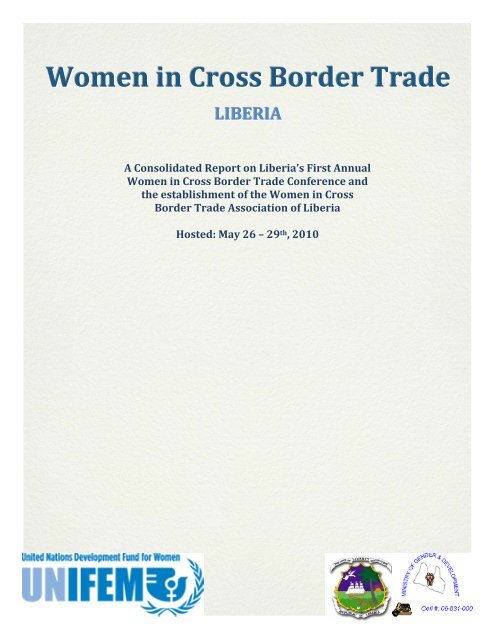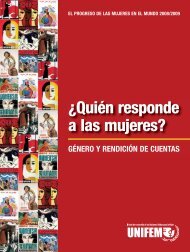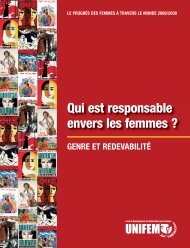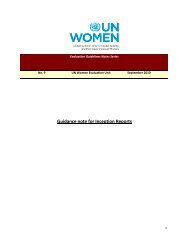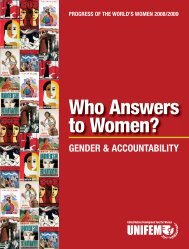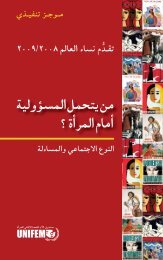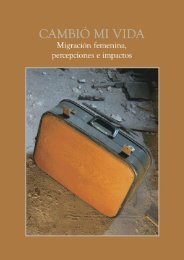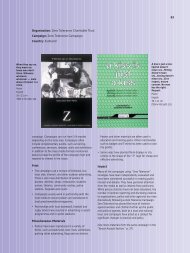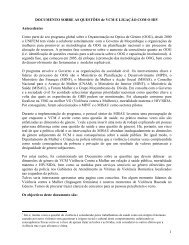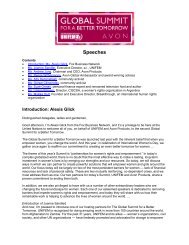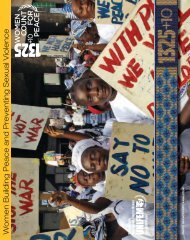Women in Cross Border Trade LIBERIA - UN Women
Women in Cross Border Trade LIBERIA - UN Women
Women in Cross Border Trade LIBERIA - UN Women
You also want an ePaper? Increase the reach of your titles
YUMPU automatically turns print PDFs into web optimized ePapers that Google loves.
<strong>Women</strong> <strong>in</strong> <strong>Cross</strong> <strong>Border</strong> <strong>Trade</strong><br />
<strong>LIBERIA</strong><br />
A Consolidated Report on Liberia’s First Annual<br />
<strong>Women</strong> <strong>in</strong> <strong>Cross</strong> <strong>Border</strong> <strong>Trade</strong> Conference and<br />
the establishment of the <strong>Women</strong> <strong>in</strong> <strong>Cross</strong><br />
<strong>Border</strong> <strong>Trade</strong> Association of Liberia<br />
Hosted: May 26 – 29 th, 2010
Background to the <strong>Women</strong> <strong>in</strong> <strong>Cross</strong> <strong>Border</strong> <strong>Trade</strong> Conference<br />
The <strong>Women</strong> <strong>in</strong> <strong>Cross</strong> <strong>Border</strong> <strong>Trade</strong> Conference was hosted by the M<strong>in</strong>istry of Gender<br />
and Development, M<strong>in</strong>istry of Commerce and Industry and the United Nations<br />
Development Fund for <strong>Women</strong> as one component targeted at the economic<br />
empowerment of women under the <strong>UN</strong> / Government of Liberia Jo<strong>in</strong>t Programme for<br />
Gender Equality and <strong>Women</strong>’s Economic Empowerment.<br />
The Conference brought together 70 women <strong>in</strong>volved <strong>in</strong> cross border trad<strong>in</strong>g from eight<br />
of Liberia’s fifteen counties. The delegates for the Conference were selected <strong>in</strong> border<br />
regions and major trad<strong>in</strong>g centers by a team of the M<strong>in</strong>istry of Gender and<br />
Development decentralized staff, the elected officials of the National Rural <strong>Women</strong>’s<br />
Structure, Immigration Officials, and Market<strong>in</strong>g Super<strong>in</strong>tendents. Delegates must have<br />
been considered reputable traders by other women <strong>in</strong> their area and have been<br />
<strong>in</strong>volved <strong>in</strong> trad<strong>in</strong>g across West African borders for more than one year. Not more than<br />
two traders <strong>in</strong> any given commodity area were allowed to represent one county.<br />
The delegates came together <strong>in</strong> Monrovia for a four‐day conference with sessions led by<br />
representatives of various Government Agencies, Regional <strong>Trade</strong> bodies, f<strong>in</strong>ancial<br />
<strong>in</strong>stitutions, local civil society organizations and <strong>in</strong>ternational partners.<br />
Objectives of the First Annual <strong>Women</strong> <strong>in</strong> <strong>Cross</strong> <strong>Border</strong> <strong>Trade</strong> Conference<br />
‐ To provide <strong>in</strong>formation to women <strong>in</strong> cross border trade on border controls,<br />
regulations, practices and regional trade agreements;<br />
‐ To provide <strong>in</strong>formation to women <strong>in</strong> cross border trade on their rights, <strong>in</strong>clud<strong>in</strong>g<br />
prevention and response to SGBV and SEA;<br />
‐ To document women’s experience <strong>in</strong> cross border trade <strong>in</strong> Liberia so that<br />
Government and partners are better able to design programs and policies to<br />
address their unique challenges and concerns;<br />
‐ To identify the unique challenges to Government and to women <strong>in</strong> cross border<br />
trade with regards to regional trade;<br />
‐ To address some of these challenges through the establishment of an Association,<br />
<strong>in</strong>creased communication and sensitization, distribution of <strong>in</strong>formation, and<br />
development of an action plan for future activities;<br />
‐ To establish an Association for <strong>Women</strong> <strong>in</strong> <strong>Cross</strong> <strong>Border</strong> <strong>Trade</strong> (AWICBT) with elected<br />
leadership.<br />
Top Challenges Expressed by <strong>Women</strong> <strong>in</strong> <strong>Cross</strong> <strong>Border</strong> <strong>Trade</strong><br />
Dur<strong>in</strong>g the Conference the <strong>Cross</strong> <strong>Border</strong> <strong>Trade</strong> Delegates jo<strong>in</strong>ed other representatives<br />
on panels cover<strong>in</strong>g a range of topics from border procedures, sexual and gender‐based<br />
violence, f<strong>in</strong>ancial services and access to credit, and regional trade bodies. Dur<strong>in</strong>g these
panels, as well as dur<strong>in</strong>g small group work, the women <strong>in</strong> cross border trade delegates<br />
consistently highlighted the follow<strong>in</strong>g challenges:<br />
Laissez Passez and Immigration Officials<br />
‐ Laissez Passez travel documents, although issued by the M<strong>in</strong>istry of Foreign Affairs<br />
and valid for 90 days, are not reliable immigration documents for the traders and<br />
are often rejected by neighbor<strong>in</strong>g counties, especially Gu<strong>in</strong>ea and Ivory Coast.<br />
Many women compla<strong>in</strong> that Immigration Officials from these countries will tear the<br />
paper document and demand money. Liberian Immigration Officials are also known<br />
to take them away upon re‐entry <strong>in</strong>to Liberia, forc<strong>in</strong>g the women to purchase new<br />
documents even though they are still valid.<br />
‐ <strong>Women</strong> are accustomed to pay<strong>in</strong>g small fees and bribes at every Immigration gate<br />
<strong>in</strong> order to pass across the border.<br />
‐ Many of the women compla<strong>in</strong>ed that even the ECOWAS passport is not respected<br />
by Immigration Officials and they can even be charged more money when carry<strong>in</strong>g<br />
the ECOWAS passport.<br />
Customs and Duties<br />
‐ <strong>Women</strong> are forced to pay the customs duty at multiple stations, despite hav<strong>in</strong>g<br />
receipt for the orig<strong>in</strong>al payment. In addition, the amount they pay is not always<br />
what is put on the receipts.<br />
‐ <strong>Women</strong> <strong>in</strong> <strong>in</strong>formal trade are unlikely to have receipts for their products and/or the<br />
necessary documents to claim orig<strong>in</strong> of goods <strong>in</strong> order to benefit from the duty‐free<br />
trad<strong>in</strong>g with<strong>in</strong> ECOWAS or the Mano River Union.<br />
‐ After discussions with the representative of the Mano River Union (MRU) to Liberia,<br />
it was clarified that without an Association for representation, <strong>in</strong>dividual traders<br />
could not benefit from the MRU duty‐free trade benefits; once they registered<br />
under an Association, the body could apply to MRU representatives for appropriate<br />
documentation for duty‐free import<strong>in</strong>g.<br />
Transportation Expenses and Losses<br />
‐ <strong>Women</strong>, particularly those trad<strong>in</strong>g cosmetics and hair products, compla<strong>in</strong>ed that<br />
they must rely on the <strong>in</strong>formal transport <strong>in</strong>dustry, often experienc<strong>in</strong>g damage to<br />
goods or even los<strong>in</strong>g goods entirely without compensation.<br />
‐ Many of the women have no means of retribution with transport drivers who lose<br />
or damage goods.<br />
‐ Transportation costs, as a whole, are quite high.<br />
‐ Transportation is very difficult, with bad road conditions, dangerous vehicles, and<br />
frequent breakdowns.<br />
Lack of Access to Adequate F<strong>in</strong>ance<br />
‐ Most women are only able to access f<strong>in</strong>ance at an <strong>in</strong>formal level, either through<br />
“sell‐pay” arrangements with merchants or through <strong>in</strong>formal lend<strong>in</strong>g groups (susus).<br />
This limits their ability to utilize credit for bus<strong>in</strong>ess expansion and trade<br />
opportunities.<br />
‐ <strong>Women</strong> at the Conference joked about micro credit as be<strong>in</strong>g “micro worry”, due to<br />
the pressure of micro f<strong>in</strong>ance <strong>in</strong>stitutions, <strong>in</strong>convenient loan cycles and high <strong>in</strong>terest<br />
rates.
‐ Despite positive <strong>in</strong>teractions with Micro F<strong>in</strong>ance Institutions and banks at the<br />
Conference, women expressed great concern at the fact that many branches were<br />
only located <strong>in</strong> the capital of Monrovia, or county seats that are far distances from<br />
where they trade.<br />
‐ <strong>Women</strong> consistently stressed the need for access to credit at lower, more<br />
manageable, <strong>in</strong>terest rates with longer payment cycles for turn<strong>in</strong>g around the<br />
capital.<br />
Sexual Exploitation and Gender Based Violence<br />
‐ <strong>Women</strong> traders faced various forms of SGBV, rang<strong>in</strong>g from sexual harassment to<br />
rape, at border cross<strong>in</strong>gs / check po<strong>in</strong>ts with<strong>in</strong> Liberia and <strong>in</strong> neighbor<strong>in</strong>g countries.<br />
‐ <strong>Women</strong> highlighted unwanted touches of sensitive body parts by customs and<br />
immigration officers. In addition, officers often forced unnecessary delays and<br />
arbitrary arrest/detention at border po<strong>in</strong>ts and/or the seizure of goods so as to<br />
deta<strong>in</strong> traders for the night <strong>in</strong> order to make sexual advances.<br />
‐ <strong>Women</strong> felt there were few options for report<strong>in</strong>g or challeng<strong>in</strong>g cases of SGBV at<br />
the border, and were not aware of the appropriate authorities to go to, particularly<br />
when the perpetrators were members of the security forces themselves.<br />
Top Opportunities Identified dur<strong>in</strong>g the Conference<br />
Formation of an Association – duty‐free imports<br />
‐ By form<strong>in</strong>g a legal association, women <strong>in</strong> cross border trade could apply to the MRU<br />
for duty‐free import<strong>in</strong>g from other MRU countries; this process was discussed and<br />
clarified with the Liberian Representative to the MRU.<br />
‐ The Association would also create a body under which to lobby for trade<br />
agreements that better accommodate the practices of <strong>in</strong>formal traders, <strong>in</strong>clud<strong>in</strong>g<br />
difficulties <strong>in</strong> atta<strong>in</strong><strong>in</strong>g official receipts, prov<strong>in</strong>g orig<strong>in</strong> of content, and transport<strong>in</strong>g <strong>in</strong><br />
bulk.<br />
Formation of decentralized structures – Group travel, transport and storage<br />
‐ The establishment of decentralized structures with<strong>in</strong> the Association (at the county<br />
level and perhaps by commodity area) would permit women to collaborate and<br />
travel together, both improv<strong>in</strong>g upon their safety and present<strong>in</strong>g better<br />
opportunities for bulk transport.<br />
‐ <strong>Women</strong> were highly encouraged by the prospect of rent<strong>in</strong>g / purchas<strong>in</strong>g transport<br />
vehicles and/or warehouse spaces for decentralized structures. By charg<strong>in</strong>g fees for<br />
use by Association members, this could cover costs while also better <strong>in</strong>sur<strong>in</strong>g the<br />
appropriate and reliable transport and security of their products.<br />
Development of f<strong>in</strong>ancial services specifically for cross border traders<br />
‐ Although wary of typical micro credit loan products, women <strong>in</strong> cross border trade<br />
are strong bus<strong>in</strong>esswomen who represent viable credit opportunities for banks and<br />
f<strong>in</strong>ancial <strong>in</strong>stitutions. The loan products for cross border traders need to offer a<br />
large enough amount of capital to make the bus<strong>in</strong>ess profitable for traders.<br />
‐ The women are also quite familiar and comfortable with <strong>in</strong>formal credit circles<br />
(susus) and the development of an Association‐led credit union could be a strong
option for county (decentralized) structures of the Association to save and lend to<br />
other members.<br />
Collaboration with Government Customs and Immigration Offices<br />
‐ The presence of the Commissioner of Customs and the Deputy Commissioner of<br />
Immigration gave the delegates confidence towards the will of Government to build<br />
a more accountable and dependable force of border officials.<br />
‐ Initial discussions were held towards the formation of a partnership between the<br />
Association and the Bureau of Immigrations and Bureau of Customs. This<br />
partnership would <strong>in</strong>clude sensitization exercises for both traders and officials to be<br />
aware of appropriate regulations, procedures and the rights of traders, as well as to<br />
set up a system for whistle blow<strong>in</strong>g.<br />
Priority Actions and Way Forward for <strong>Women</strong> <strong>in</strong> <strong>Cross</strong> <strong>Border</strong><br />
<strong>Trade</strong> Association of Liberia<br />
1. Publish the <strong>Women</strong> <strong>in</strong> <strong>Cross</strong> <strong>Border</strong> <strong>Trade</strong> Association Resolution <strong>in</strong> national<br />
newspapers.<br />
2. Conduct sensitization of women cross border traders at the county level, followed by<br />
county elections to establish decentralized structures for the Association.<br />
3. Officially register the Association with the M<strong>in</strong>istry of Foreign Affairs and M<strong>in</strong>istry of<br />
Labor.<br />
4. Establish bank account(s) for the Association.<br />
5. Meet<strong>in</strong>g of Association leadership to review outcomes of the Conference and f<strong>in</strong>alize<br />
policy priorities for discussion with Government of Liberia Officials.<br />
6. Participation of WICBTA members <strong>in</strong> security tra<strong>in</strong><strong>in</strong>gs for border officials <strong>in</strong> the various<br />
counties on SEA and SBGV.<br />
7. Organizational Development tra<strong>in</strong><strong>in</strong>g for the leaders of the National Association and<br />
decentralized structures to ensure management and leadership skills, as well as to<br />
strengthen <strong>in</strong>stitutional capacity.<br />
8. Application to the Mano River Union for certificates for duty‐free import of products (by<br />
commodity area).<br />
9. Establish new credit opportunities for members, either through partnerships with banks<br />
or f<strong>in</strong>ancial <strong>in</strong>stitutions, or through appropriate tra<strong>in</strong><strong>in</strong>g and the establishment of<br />
decentralized Association Sav<strong>in</strong>gs and Loan schemes.<br />
10. Establish basic literacy + bus<strong>in</strong>ess skills tra<strong>in</strong><strong>in</strong>gs for women <strong>in</strong>volved <strong>in</strong> cross border<br />
trader, cognizant of their travel schedules and the need for flexible class schedules<br />
(<strong>in</strong>tensive while they are <strong>in</strong> Liberia).<br />
11. Prepare bus<strong>in</strong>ess and susta<strong>in</strong>ability plans for Association‐managed warehouses and<br />
transportation at various border cross<strong>in</strong>gs.
Resolution Adopted by the newly‐established <strong>Women</strong> <strong>in</strong> <strong>Cross</strong><br />
<strong>Border</strong> <strong>Trade</strong> Association of Liberia<br />
We, the <strong>Women</strong> <strong>in</strong> <strong>Cross</strong> <strong>Border</strong> <strong>Trade</strong> Association of Liberia:<br />
Urge the Government of Liberia and the security agencies to take stronger actions to<br />
stop the corrupt practices of customs, immigration and other border officers and to<br />
put an end to the sexual violence and exploitation at our borders;<br />
Call on the Mano River Union, ECOWAS and the M<strong>in</strong>istry of Foreign Affairs to make sure<br />
that the rights of Liberian women are protected <strong>in</strong> other West African countries;<br />
Further call on the Mano River Union, ECOWAS and Liberian Customs to simplify their<br />
policies and to work with women <strong>in</strong>volved <strong>in</strong> <strong>in</strong>formal trad<strong>in</strong>g of goods, recogniz<strong>in</strong>g<br />
that we do not always receive official receipts for our goods, so that we, the<br />
<strong>in</strong>formal traders, can also benefit from duty‐free trad<strong>in</strong>g with<strong>in</strong> the region;<br />
Stress the urgent need for more storage facilities to ease the safety hazards and<br />
burdens of cross border trad<strong>in</strong>g;<br />
Urge the banks and f<strong>in</strong>ancial <strong>in</strong>stitutions to consider the needs and constra<strong>in</strong>ts of cross<br />
border traders and to develop appropriate loan and bank<strong>in</strong>g products with more<br />
time to pay loans at lower <strong>in</strong>terest rates;<br />
Call on women <strong>in</strong>volved <strong>in</strong> cross border trade to respect the laws, always carry their<br />
correct documents, refuse to pay bribes, and report corrupt practices;<br />
And advocate for the expansion of the Association of <strong>Women</strong> <strong>in</strong> <strong>Cross</strong> <strong>Border</strong> <strong>Trade</strong> <strong>in</strong><br />
order to serve as a representative body that will <strong>in</strong>form women traders of their<br />
rights and work to protect them.<br />
Signed by the found<strong>in</strong>g seventy members of the <strong>Women</strong> <strong>in</strong> <strong>Cross</strong> <strong>Border</strong> <strong>Trade</strong> Association of Liberia and<br />
its elected leadership on the 29 th of May, 2010.


